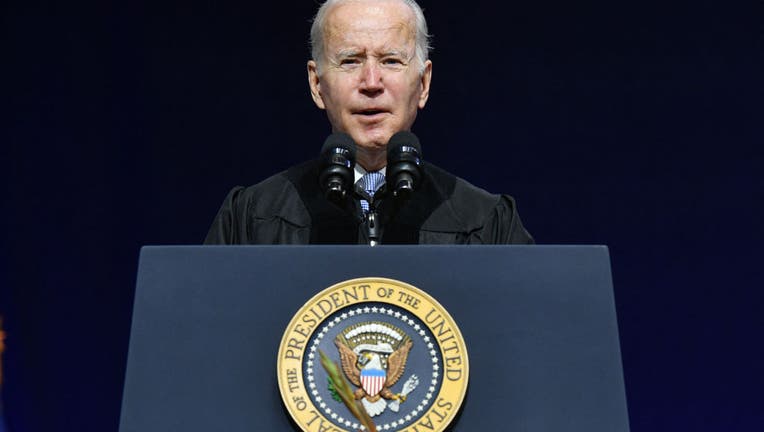Biden tests negative for COVID-19 after close contact with infected staffer

US President Joe Biden addresses graduates of South Carolina State University during their commencement ceremony on December 17, 2021, in Orangeburg, South Carolina. (Photo by MANDEL NGAN / AFP) (Photo by MANDEL NGAN/AFP via Getty Images)
WASHINGTON - President Joe Biden has tested negative for COVID-19 after coming in close contact with a staff member who tested positive for the virus, according to a White House statement.
"On Monday morning, a mid-level staff member, who does not regularly have contact with the President, received a positive result for a COVID-19 test.," press secretary Jen Psaki said Monday. "Three days earlier, on Friday, that staff member had spent approximately 30 minutes in proximity to the President on Air Force One, on the way from Orangeburg, South Carolina to Philadelphia, Pennsylvania."
"This staff member is fully vaccinated and boosted, and tested negative prior to boarding Air Force One, as is required for everyone traveling with the President," she continued. "This staff member did not begin to experience symptoms until Sunday, and was tested on Monday."
RELATED: CDC data: Omicron now dominant COVID-19 variant in US
Psaki said other people on Air Force One who were in close contact with the unidentified staffer are being contacted and advised to get tested for the virus. She said Biden is tested on regular basis and received an antigen test on Sunday, which tested negative.
Biden took another test Monday morning which showed a negative result after learning the staffer had contracted the illness.
Psaki said Biden will be tested again Wednesday.
"As CDC guidance does not require fully vaccinated people to quarantine after an exposure, the President will continue with his daily schedule," the statement continued.
RELATED: COVID cases are surging nationwide, creating major obstacles ahead of the holidays
The developments come as COVID-19 cases continue to rise in the United States and across the globe.
On Monday, the U.S. Centers for Disease Control and Prevention said the omicron variant is now the dominant strain, accounting for 73% of new infections last week.
The CDC’s numbers showed nearly a six-fold increase in omicron’s share of infections in only one week.
In much of the country, it’s even higher. Omicron is responsible for an estimated 90% or more of new infections in the New York area, the Southeast, the industrial Midwest and the Pacific Northwest. The national rate suggests that more than 650,000 omicron infections occurred in the U.S. last week.
Since the end of June, the delta variant had been the main strain causing U.S. infections. As recently as the end of November, more than 99.5% of COVID-19 cases were delta, according to CDC data.
Scientists in Africa first sounded the alarm about omicron less than a month ago and on Nov. 26 the World Health Organization designated it as a "variant of concern." The mutant has since shown up in about 90 countries.
Much about the omicron variant remains unknown, including whether it causes more or less severe illness. Early studies suggest the vaccinated will need a booster shot for the best chance at preventing omicron infection but even without the extra dose, vaccination still should offer strong protection against severe illness and death.
RELATED: Moderna: COVID booster effective against omicron in tests, will still develop new shot
On Monday, Moderna said lab tests showed the half-dose booster shot increased by 37 times the level of so-called neutralizing antibodies able to fight omicron.
And a full-dose booster was even stronger, triggering an 83-fold jump in antibody levels, although with an increase in the usual side effects, the company said. While half-dose shots are being used for most Moderna boosters, a full-dose third shot has been recommended for people with weakened immune systems.
Pfizer’s testing likewise found its COVID-19 vaccine triggered a similarly big jump in omicron-fighting antibodies. The vaccines made by Pfizer and by Moderna, both made with mRNA technology, are used by many countries around the world to fight the coronavirus.
Antibody levels predict how well a vaccine may prevent infection with the coronavirus but they are just one layer of the immune system’s defenses. Other research suggests the vaccine still should induce good protection against severe disease if people do experience a breakthrough infection.
Both Moderna and Pfizer are developing shots to better match the omicron variant in case they’re needed.
The Associated Press contributed to this report. This story was reported from Los Angeles.




